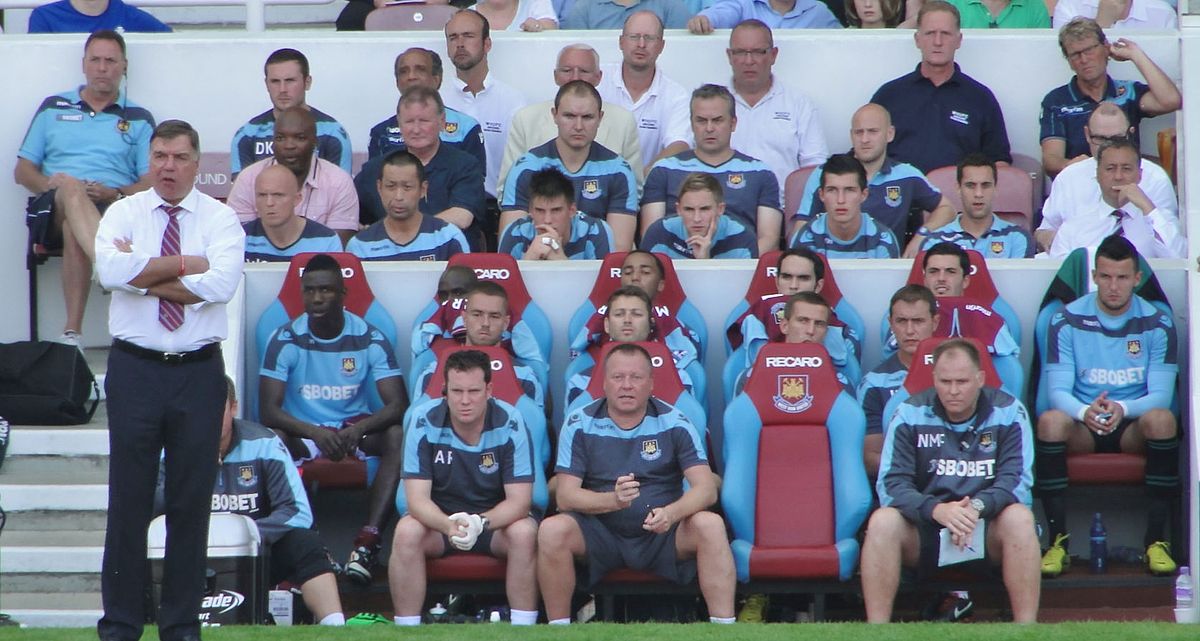New England manager Sam Allardyce will take his players to Slovakia next month as they start qualification for the 2018 World Cup in Russia and seek to wipe away the memories of a woeful performance at Euro 2016. It will be a huge challenge that calls upon all the weapons Allardyce has amassed in his career. Managers outside of football would do well to consider how his approach could work for them.
When the business world seeks inspiration from football, Allardyce is perhaps not the first name on the list. Arsene Wenger’s steady calculation, Jose Mourinho’s brutish pragmatism or Pep Guardiola’s collaborative panache probably grab more attention.
But there is gold there. I worked with Allardyce during his managerial years at Bolton Wanderers, and studied how he sought profound change without coercion. We can use some of these to build an idea of what an Allardyce Business School might look like.
1. Build for the long-term
Football is dominated by the immediate: the next result or the next sacking. But Allardyce focused on establishing departments and systems that would last beyond his tenure. He spoke at length about leaving a legacy at Bolton that was not simply focused on achieving European football – as the club did under his leadership.
To this end, he strengthened the youth academy and several players secured a regular place in his first team. Although he never achieved his dream of having a first team composed completely of players nurtured by this system, he invested time and resources in the foundations.
2. Love your budget
If you have no money and you have had to sell your best players in order for the club to stay afloat, how will you secure and sustain high performance? Smart managers work with what they’ve got. For Allardyce, a central solution to this knotty problem was to exploit sports science.
He was an early proponent of “marginal gains”, an approach that helped him to sign world-class players who perhaps wouldn’t otherwise have looked at Bolton as an option. This combination of physiotherapy, sports psychology, nutrition, and data analytics allowed players to play more regularly – especially in the crucial last third of the season – because of their injury prevention strategy. It also prolonged the life of significant players like Youri Djorkaeff, Ivan Campo and Gary Speed.
Data analytics also gave his team an edge by spotting where advantage might be gained, developing responses to set pieces, or identifying areas of the pitch where the opposition struggled.
3. Have a plan, and another plan
Allardyce understood that things can get thrown off track. Making a team effective means you have to plan across various time-frames: for each game, for each segment of the season, and across the season. You have to secure stability and guard against the emotional drama caused by results, good and bad. And you also have to spot when it’s time to mix it up and play cards before a big game instead of watching a series of pre-match videos.
In other words, build against chaos but then introduce it to good effect. Stability can instigate boredom and regimented attitudes rather than provoking creativity.
4. Value people
After one frustrating loss against Manchester City Allardyce asked where I was and discovered I had been at a family wedding in Edinburgh. In a fit of pique he argued that I was part of the Bolton family and as such should’ve been at the game. It sounds ridiculous, but that motif of the Bolton family and of respect for each other ran through the club. Wins were shared with all who contributed.
It’s not always easy to belong to a family; it can be suffocating. But being included and valued for your efforts remains with you forever.
5. Listening
In these days of leader/manager pronouncement, the art of listening is dying fast. Many managers seem pressured into rhetoric while many of us become deaf to it. But what happens when you spend more time listening? Especially if you listen well and accurately, as Allardyce does. During his time at Bolton, he hated doing “the motivational speech” before the game and rarely did. To everyone’s relief, I think.
I’m all ears. Tambako The Jaguar, CC BY-NC-ND
6. Be vulnerable
Finally, it is important to be so secure in yourself that you can be honest about who you are and what you value and why – whether (as in Allardyce’s case) it’s the NHS, education, family, or the friends you have outside the game. Take what you do very seriously, but take yourself less so.
Allardyce remains famous for being able to take on players whose psychometric profile might have put others off. El Hadji Diouf was the most obviou examples.
Allardyce sought to understand them and ensured that key staff like Mike Forde, the team’s performance manager, did so too. I would argue that this is secured through feel and intuition for the player and key to this is vulnerability, a sense of being wholehearted and worthy of emotional connection.
And so what do we learn at the “Allardyce Business School”, from a manager who has now reached what some would call the apex of his profession? For a start, it is a very different kind of business school and offers a critique of contemporary business management. Allardyce never shied way from fundamentals like planning and securing performance – they are the foundations of success. But his lectures and seminars would also reject the short-term perspectives of current business schools, emphasising instead plans for the longer-term which leave powerful, positive legacies for the communities they are in.
In a market with substantial competition – Bolton Wanderers is in an area rich with exceptional football teams of higher pedigree – you can’t simply secure competitive advantage through something like sports science. It is achieved through becoming an organisation that people value, love and want to be a part of: fans, employees, players, and academics alike. The Allardyce Business School would teach you to acknowledge your organisation’s history and its connection with its community. A legacy isn’t based on results alone but on how you play the game.
 Sarah Gilmore does not work for, consult, own shares in or receive funding from any company or organisation that would benefit from this article, and has disclosed no relevant affiliations beyond the academic appointment above.
Sarah Gilmore does not work for, consult, own shares in or receive funding from any company or organisation that would benefit from this article, and has disclosed no relevant affiliations beyond the academic appointment above.
Sarah Gilmore, Principal Lecturer in Organisation Studies, University of Portsmouth
This article was originally published on The Conversation. Read the original article.




 From Messi to Mika Häkkinen: how top athletes can slow down time
From Messi to Mika Häkkinen: how top athletes can slow down time  Champions League final 2025: a battle for glory against a backdrop of money and fashion
Champions League final 2025: a battle for glory against a backdrop of money and fashion  Trump Draws Cheers at Ryder Cup as U.S. Trails Europe After Opening Day
Trump Draws Cheers at Ryder Cup as U.S. Trails Europe After Opening Day  Los Angeles Mayor Says White House Must Reassure Fans Ahead of FIFA World Cup
Los Angeles Mayor Says White House Must Reassure Fans Ahead of FIFA World Cup  U.S. Plans $115 Million Counter-Drone Investment to Secure FIFA World Cup and Major National Events
U.S. Plans $115 Million Counter-Drone Investment to Secure FIFA World Cup and Major National Events  US Reviewing Visa Denial for Venezuelan Little League Team Barred from World Series
US Reviewing Visa Denial for Venezuelan Little League Team Barred from World Series  NBA Returns to China with Alibaba Partnership and Historic Macau Games
NBA Returns to China with Alibaba Partnership and Historic Macau Games  How did sport become so popular? The ancient history of a modern obsession
How did sport become so popular? The ancient history of a modern obsession  Extreme heat, flooding, wildfires – Colorado’s formerly incarcerated people on the hazards they faced behind bars
Extreme heat, flooding, wildfires – Colorado’s formerly incarcerated people on the hazards they faced behind bars  Trump Plans UFC Event at White House for America’s 250th Anniversary
Trump Plans UFC Event at White House for America’s 250th Anniversary 

































